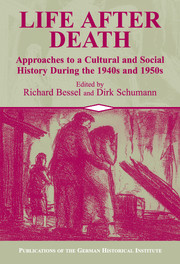Book contents
- Frontmatter
- Introduction Violence, Normality, and the Construction of Postwar Europe
- 1 Post-Traumatic Stress Disorder and World War II
- 2 Between Pain and Silence
- 3 Paths of Normalization after the Persecution of the Jews
- 4 Trauma, Memory, and Motherhood
- 5 Memory and the Narrative of Rape in Budapest and Vienna in 1945
- 6 “Going Home”
- 7 Desperately Seeking Normality
- 8 Family Life and “Normality” in Postwar British Culture
- 9 Continuities and Discontinuities of Consumer Mentality in West Germany in the 1950s
- 10 “Strengthened and Purified Through Ordeal by Fire”
- 11 The Nationalization of Victimhood
- 12 Italy after Fascism
- 13 The Politics of Post-Fascist Aesthetics
- 14 Dissonance, Normality, and the Historical Method
- Index
10 - “Strengthened and Purified Through Ordeal by Fire”
Ecclesiastical Triumphalism in the Ruins of Europe
Published online by Cambridge University Press: 05 January 2013
- Frontmatter
- Introduction Violence, Normality, and the Construction of Postwar Europe
- 1 Post-Traumatic Stress Disorder and World War II
- 2 Between Pain and Silence
- 3 Paths of Normalization after the Persecution of the Jews
- 4 Trauma, Memory, and Motherhood
- 5 Memory and the Narrative of Rape in Budapest and Vienna in 1945
- 6 “Going Home”
- 7 Desperately Seeking Normality
- 8 Family Life and “Normality” in Postwar British Culture
- 9 Continuities and Discontinuities of Consumer Mentality in West Germany in the 1950s
- 10 “Strengthened and Purified Through Ordeal by Fire”
- 11 The Nationalization of Victimhood
- 12 Italy after Fascism
- 13 The Politics of Post-Fascist Aesthetics
- 14 Dissonance, Normality, and the Historical Method
- Index
Summary
“If they have died as the children of God with remorse for their sins, then . . . the gassed have in a moment found that which we, for all our searching and groping, cannot find: the truth, the light.” After 1945, from the Catholic Church's point of view, there was nothing to add to what it had always propounded about modern societies, about wars, and about violence: Wars are bad because they cause death and suffering, but they are legitimated as “just wars” when they serve against aggressors, unjust regimes, and dictatorships. These regimes are the result of people and societies failing to subordinate themselves to the Church. The Church's main opponent was not war, suffering, or violence, but the Modern Age itself with the waning of ecclesiastical power as a result of secularization. As the agent of God's will, the Church alone knew how to build a peaceful society. The destruction and devastation of the time drastically confirmed this conviction. Churchmen simply did not perceive the very specific nature of the violence of this period. It was not so much a case of mundane disinterest in experiences of violence (which was particularly evident in West Germany) but of a particularly stubborn insistence on old political, ideological, and religious stereotypes.
- Type
- Chapter
- Information
- Life after DeathApproaches to a Cultural and Social History of Europe During the 1940s and 1950s, pp. 231 - 242Publisher: Cambridge University PressPrint publication year: 2003
- 2
- Cited by



